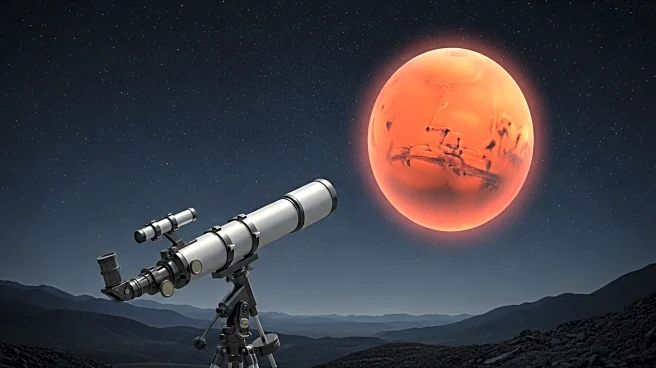What's Happening?
In the late 19th century, Percival Lowell, an American astronomer, popularized the idea that Mars had a sophisticated irrigation system, suggesting intelligent life existed on the planet. Lowell's theories were based on observations of 'canals' on Mars, initially noted by Italian astronomer Giovanni Schiaparelli. Despite skepticism from the scientific community, Lowell's ideas gained traction in American popular culture, influencing media and public perception. His lectures and publications helped spread the notion of Martians, contributing to a cultural fascination with extraterrestrial life. This craze was further fueled by sensationalist media and works like H.G. Wells' 'The War of the Worlds.'
Why It's Important?
Lowell's theories on Mars had a significant impact on American culture, illustrating how scientific ideas can permeate public consciousness and influence societal beliefs. The fascination with Martians reflected broader themes of exploration and the unknown, resonating during a time of rapid technological and social change. This cultural phenomenon highlights the power of media in shaping public opinion and the enduring allure of space exploration. The legacy of Lowell's ideas can be seen in contemporary interest in Mars, including efforts by figures like Elon Musk to explore and potentially colonize the planet.
What's Next?
While Lowell's theories were eventually discredited, the fascination with Mars continues to inspire scientific inquiry and exploration. Modern efforts to explore Mars, such as NASA's missions and private ventures like SpaceX, aim to uncover the planet's mysteries and assess its potential for human habitation. These initiatives reflect ongoing interest in space exploration and the possibility of life beyond Earth, driving technological advancements and international collaboration in the field.
Beyond the Headlines
The historical fascination with Mars and Lowell's theories underscore the interplay between science and culture, revealing how speculative ideas can influence societal narratives. This dynamic persists today, as scientific discoveries and technological innovations continue to shape cultural perceptions and aspirations. The story of Lowell and Mars serves as a reminder of the importance of critical thinking and the need to balance imagination with scientific rigor.









